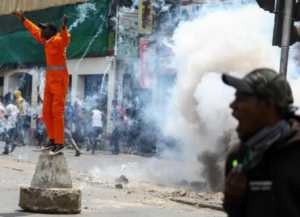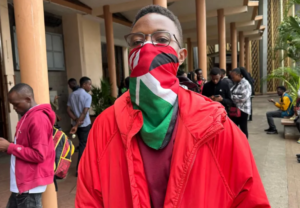Kenyan Protests: A Spark That Will Set the Church on Fire
Not only have the recent student protests in Kenya against planned tax rises shaken up the political scene, but they have also woken up the Church. Protests have cast doubt on the authority of the Christian church in a nation where the president and more than 80% of the population identify as Christians.
The Church and Young People’s Protests The youth of the protests claimed that the church was in collusion with the government, particularly those politicians who made political speeches from the pulpit. Generation Z, a tech-savvy cohort, felt the Church was not on their side in the fight against steep tax increases, and their concerns have come to light in the protests.
A special Mass was organized by Catholic authorities for the youth of churches in and around Nairobi on a recent Sunday afternoon as a response. The victims of the anti-tax protests who were shot and murdered by police officers were remembered at this Mass. At the Holy Family Basilica, hundreds of young people gathered for a moment of reflection and unity as they prayed for the deceased.

At least 39 people were killed during the protests that started on June 25
Religious Authorities Resolve Issues
Bishop Simon Kamomoe recognized the youths’ disillusionment with the Church throughout the Mass. In addition to apologizing for the Church’s errors, he promised to serve them better going forward. Notable for his forthrightness, he cautioned the youth to keep quiet and defend themselves.
During the Mass, there was lively singing, and at the finish, everyone cheered loudly while waving Kenyan flags. A lot of people thought the service was a good, if delayed, beginning.
A Watershed Moment in the Protests
There were at least 39 fatalities as a result of the demonstrations that started on June 25. They emphasized how seriously the youth took their complaints. One protester, Yebo, pointed out that the Church had been ambivalent for quite some time. The youth’s doggedness paid off, and President William Ruto backed down from the planned tax increases.
An Intimate Bond Under Investigation
Protesters from Generation Z also denounced what they saw as an intimate alliance between Christian and political groups. This anxiety was heightened by assumptions that religious leaders had visited the state capitol during the demonstrations. Demonstrator Meshack Mwendwa shared the view of many young people that the president was trying to buy off the faith community. Pictures of religious leaders posing with government officials circulated online only served to heighten these misgivings.

The Need for Alteration
The demonstrators were successful in getting the practice of “harambee,” in which politicians would make huge payments to the Church in an effort to buy influence, outlawed. Occupy movement supporters wanted to keep churches and other houses of worship out of politics.
Protesters even went so far as to demand that President Ruto stop attending events hosted by the church. It was not appropriate for Ruto to use places of worship for political reasons; thus, he backed the idea of keeping politics out of the pulpit. Subsequently, he ordered the attorney general to establish a system for organized and open donations and outlawed public servants and state executives from making public charity contributions.
Future of the Church and Its Role
The renowned Pastors have a hard time calling President Ruto to account because of his strong Christian narrative, according to Chris Kinyanjui, general secretary of Kenya’s National Council of Churches (NCCK). The president has been influential in religious and political spheres due to his usage of the pulpit. The younger generation, known as Gen Z, is beginning to doubt this dynamic and is pushing for more autonomy for religious organizations from the state.
There has been a backlash among Kenya’s youth recently, and it might change the country’s power dynamics. They are the backbone of society and are throwing conventional wisdom for a loop in the political system. It has now caught the attention of the president and the Church.
A Demand for Responsibility
Michelle Mbugua, speaking outside the basilica as the Mass came to a close, stressed the significance of the Church hearing the complaints of the young. Because young people make up a sizable portion of the church’s membership, their backing is essential.
The young social compact in Kenya is precarious, Reverend Kinyanjui said, drawing a comparison to Sudan, where a coup d’état put a stop to a youth revolt and the country descended into civil war. It was a relief, he said, that President Ruto had defused the situation by declining to sign the budget bill.

President Ruto withdrew the contested tax bill and fired almost his entire cabinet in response to the protests
The Next Steps
In an effort to become society’s voice and conscience, the NCCK intends to take a more active and public stance. They look to the youth of Generation Z as a vital component of the movement to challenge and reform the system. Many pastors have been roused to the necessity of reform and increased responsibility by the recent demonstrations.
In summary
There is a chasm between young people and the Church, as the Kenyan protests have shown. Maintaining its influence while responding to the valid concerns of its flock is a fine line that the Church must walk as it seeks to win back the trust of the youth. The current events in Kenya have ushered in a period of greater responsibility and reform in the country’s religious and political institutions.



















